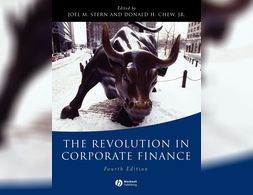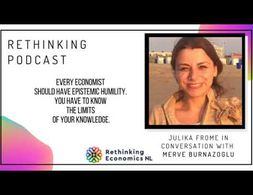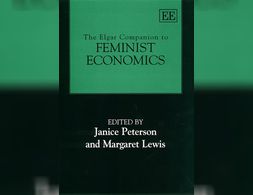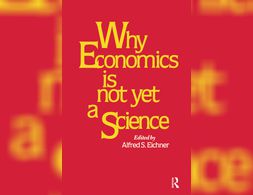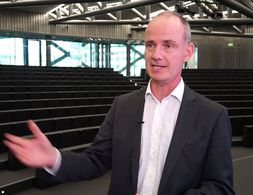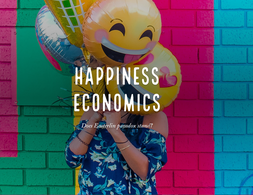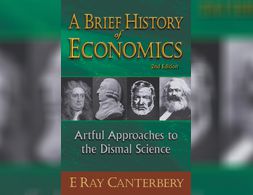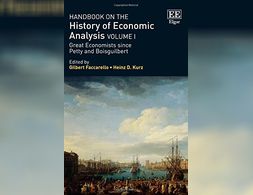✕
363 results
This workshop offers an introduction to Degrowth and Ecological Economics. It starts by surveying the socio-ecological crisis and its pseudo-solutions, and then moves to Ecological Macroeconomics as a relatively recent field of scholarship within Ecological Economics.
This course has dual purposes, to introduce students to the various stages of research and to provide an introduction to feminist perspectives on the politics of producing knowledge. Each student will learn how to be an interdisciplinary researcher while coming to understand the opportunities that feminism presents as a way of seeing, knowing, and representing the world.
The Revolution in Corporate Finance has established itself as a key text for students of corporate finance with wide use on a range of courses. Using seminal articles from the highly regarded Bank of America Journal of Applied Corporate Finance, it gives students real insight into the practical implications of the most recent theoretical advances in the field.
The most successful multialternative theories of decision making assume that people consider individual aspects of a choice and proceed via a process of elimination. Amos Tversky was one of the pioneers of this field, but modern decision theorists – most notably Neil Stewart – have moved things forward. At the current stage the theories are able to explain a number of strictly ‘irrational’ but reasonable quirks of human decision making, including various heuristics and biases. Not only this, but eye movements of participants strongly imply that the decision-making process depicted in the theories is an accurate one.
Rethinking Economics NL explores every month together with a new host the field of economics from a different perspective.
"A serious reconsideration of the 'economics of science' is long overdue," say Philip Mirowski and Esther-Mirjam Sent in the introduction to Science Bought and Sold. Indeed, it is only recently that one could speak of a field of economics of science at all.
The Elgar Companion to Feminist Economics is the first comprehensive reference work introducing readers to the field of feminist economics. It includes 99 entries by 88 authors.
Feminist economics is a key component of the movement for pluralism in economics and one that has, to some extent, been acknowledged by the mainstream of the profession. It seeks to highlight issues which affect women because (it claims) they have not traditionally been recognised in a field dominated by men. On top of this, it seeks to carve out a space for women in the discipline, both for intrinsic reasons of fairness and diversity and because it means that women’s issues are more likely to be highlighted going forward.
This syllabus opens a literary overview of must-read papers in the field of development economics.
This video explains what the term 'Feminist Economics' describes and goes into detail on how feminist economists use methodology differently, why they advocate for diversity in research and how to look into preconditions for the functioning of our economies. It, additionally, highlights the link between feminist economics and the study of climate change.
This essay draws on several analyses on the gender impact of the recession and of austerity policies, in which authors acknowledge a threat to women’s labour market integration and a potential backlash to traditional gender labour structures. We contribute to that literature by asking whether recession and austerity convey a gender effect on educational attainment. Our aim in this essay is to portray the likely effects of austerity measures on gender equality with a focus on women’s participation in tertiary education and to hypothesize the implications of these scenarios for labour market effects, to be tested in future empirical research.
Feminist economics focuses on the interdependencies of gender relations and the economy. Care work and the partly non-market mediated reproduction sphere are particularly emphasised by feminist economics.
International Economics, 15e continues to combine rigorous economic analysis with attention to the issues of economic policy that are alive and important today in this field.
In this episode of the podcast "Hear this idea", Dr. Carolina Alves delves into the political debate surrounding Heterodox Economics and elaborates on D-Econ's mission to promote greater inclusivity in the field of Economics concerning gender, race, and representation from the Global South.
The Elgar Companion to Neo-Schumpeterian Economics surveys the achievements of the most visible scholars in this area. The contributions to the Companion give both a brief survey on the various fields of neo-Schumpeterian economics as well as insights into recent research at the scientific frontiers.
First published in 1983. A collection of papers directed at those outside the field of Economics, to open up discussions around the scientific worth of Economics.
Economist and 2020 Balzan Prize winner for Environmental Challenges: Responses from the Social Sciences and Humanities, Joan Martínez Alier, speaks on the importance of ecological economics and its timeliness around the 2007/2008 global financial crisis. He speaks on the importance of building the field of ecological economics “from the ground up” through praxis.
Ha Joon Chang exposes the main ideas of his book Bad Samaritans, namely that historically states have developed and industrialized by making policy interventions related to industry protection, tariffs and subsidies and not by opening their markets to free trade. Chang elaborates on the examples of Japan, the US, Singapore and Germany amongst others to show that an interventionist path to development has been the regularity and not an anomaly. In the end of the lecture, he argues that they idea of a level playing field should be replaced by a trade order that accounts for differences in power and economic capacities of different countries. The last 20 minutes are questions and answers.
Gilles Carbonnier, Professor of Development Economics and Director of Studies at The Graduate Institute Geneva, explains the emerging field of Humanitarian Economics. It analyses how economics can help to better grasp and respond to humanitarian crises, and why capturing market dynamics - including the humanitarian market itself, or in relation to e.g. kidnapping and detention in war - has become critical.
Happiness economics is a branch in behavioral economics, where it explores the economics factors and consequences of happy humans. What makes people happier, and what benefits do we get when people are happier? This dossier introduces you to the field of happiness economics, from a review of economic factors proposed to influence people’s happiness, to a discussion of the economic consequences of happiness, and concludes with economic policy implications of happiness economics.
In this one-on-one interview, co-host Gerardo Serra talks with Felwine Sarr, author of Afrotopia (2016) and professor of economics at Gaston Berger University in Senegal. Topics include the relevance (or lack thereof) of development economics to conditions in African economies, the significance of African philosophy for thinking about the economic problems of the continent, and the status of the field of history of economic thought in Africa.
The workshop introduces into the field of critical political economy and tries to identify the role of finacial markets in capitalism, the reason for financial crises and the relevance of Marx in regard to these topics.
Feminist economics critically analyzes both economic theory and economic life through the lens of gender, and advocates various forms of feminist economic transformation. In this course, we will explore this exciting and self-consciously political and transformative field.
In a span of around 12 weeks, the course covers a wide range of topics including agent-based modeling, networks, dynamic, chaos, information, fractals, cooperation models and scaling in biology and society. The course acts as a perfect beginner level introduction spanning a wide range of topics in the field of complexity.
Gender, Development, and Globalization is the leading primer on global feminist economics and development. Lourdes Benería, a pioneer in the field of feminist economics, is joined in this second edition by Gunseli Berik and Maria Floro to update the text to reflect the major theoretical, empirical, and methodological contributions and global developments in the last decade.
Geographical economics starts from the observation that economic activity is clearly not randomly distributed across space. This revised and updated introduction to geographical economics uses the modern tools of economic theory to explain the who, why and where of the location of economic activity. The text provides an integrated, first-principles introduction to geographical economics for advanced undergraduate students and first-year graduate students, and has been thoroughly revised and updated to reflect important developments in the field, including new chapters on alternative core models and policy implications.
With the collapse of the planned economies of Eastern Europe, the market is extending its reach and at the same time claiming its universal applicability. But this is occurring while paradoxically it is becoming more difficult to define "the market". The authors, all outstanding scholars in the booming field of socio-economics, explore how concrete markets are built up and stabilized.
Blending past and present, this brief history of economics is the perfect book for introducing students to the field.A Brief History of Economics illustrates how the ideas of the great economists not only influenced societies but were themselves shaped by their cultural milieu. Understanding the economists' visions ? lucidly and vividly unveiled by Canterbery ?
Taking as its starting point the interdependence of the economy and the natural environment, this book provides a comprehensive introduction to the emerging field of ecological economics.
Edited by two of the foremost academics in the field, the volumes comprise insightful and original contributions from scholars across the world. The encyclopaedic breadth and scope of the original entries will make these reference books an invaluable source of knowledge for all serious students and scholars of the history of economic thought.
Ecological economics addresses one of the fundamental flaws in conventional economics--its failure to consider biophysical and social reality in its analyses and equations. Ecological Economics: Principles and Applications is an introductory-level textbook that offers a pedagogically complete examination of this dynamic new field.
This book gives a very clear overview of the history of Macroeconomics and how it has evolved. It reflects on the different perspectives and debates that have defined the field, with valuable insight into the history and theory of economic policy.
We use cookies on our website. Click on Accept to help us to make Exploring Economics constantly better!


